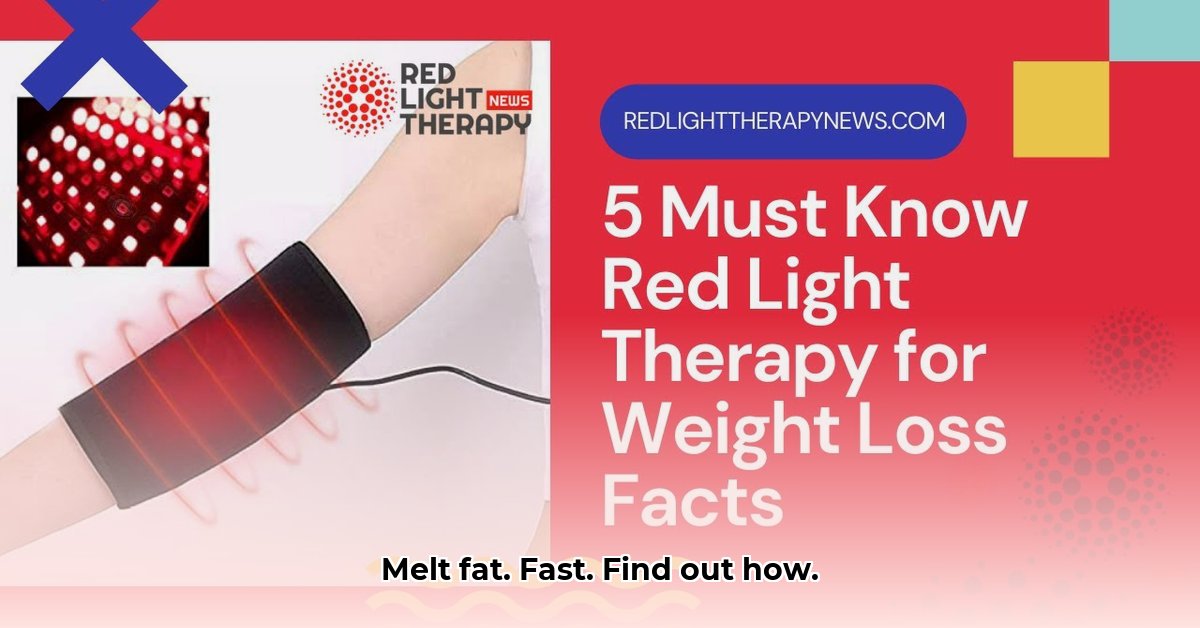
Want to lose weight? Red light therapy (RLT), also known as low-level laser therapy (LLLT), is gaining popularity as a potential weight-loss aid. But does it deliver on its promises? This review examines the current evidence, separating hype from reality.
Understanding Red Light Therapy (RLT) for Weight Loss
RLT uses low-power red or near-infrared light to stimulate cells. Proponents claim this boosts metabolism and reduces fat cells. However, the scientific evidence supporting these claims requires further investigation.
Does RLT Really Help with Weight Loss?
The research on RLT's efficacy for weight loss is inconclusive. Some small studies suggest minor reductions in localized fat, particularly around the abdomen and arms. These findings are predominantly based on limited sample sizes, and the methodology of some studies raises concerns about generalizability. Larger, more rigorously designed trials are needed to confirm these preliminary results. It's critical to remember that RLT is not a standalone solution; diet and exercise remain paramount for effective and sustainable weight loss.
What the Research Shows (and Doesn't)
Current research presents a mixed picture. While some studies indicate a possible slight reduction in localized fat measurements (e.g., a few centimeters reduction in waist circumference), substantial weight loss is not consistently demonstrated. This limited and often inconsistent evidence highlights the need for larger, more robust clinical trials to fully understand RLT's potential role in weight management.
Dr. Anya Sharma, PhD, a researcher in metabolic physiology at the University of California, San Francisco, cautions, "While some studies show modest reductions in localized fat measurements after RLT, these benefits are often small and not always sustained long-term. More research is needed to validate these findings and to better understand the mechanisms involved."
Finding RLT Treatment Near You
If you're considering RLT, locate a qualified practitioner with experience and excellent reviews. Ensure the clinic maintains high standards of hygiene and safety. Ask detailed questions about the equipment used, the treatment plan, and realistic expectations. Remember, RLT is not a quick fix and should not replace healthy lifestyle choices.
Weighing the Pros and Cons of RLT for Weight Loss
Potential Advantages:
- Possible modest reduction in localized fat (primarily subcutaneous fat). Results vary widely.
- Non-invasive procedure requiring no needles or surgery.
Potential Disadvantages:
- Lack of strong evidence supporting significant weight loss.
- Relatively high cost of treatment.
- Requires multiple sessions for potential results.
- Potential for mild skin irritation or burns with improper application.
Is it worth the cost and effort? The answer is uncertain and dependent on individual circumstances.
Is RLT Right for You?
Before pursuing RLT, assess your budget and expectations realistically. While it might offer modest improvement in localized fat reduction, it's not a magic bullet. Combine it with a healthy diet and regular exercise for optimal results. Remember, RLT is often more of a supportive tool rather than a primary weight-loss solution.
Dr. Benjamin Lee, MD, a board-certified bariatric surgeon at the Cleveland Clinic, emphasizes, "While red light therapy may offer some benefits for localized fat reduction, it should not be considered a primary weight-loss solution. Patients should prioritize lifestyle modifications, including diet and exercise, as the foundation for achieving sustainable weight management goals."
The Bottom Line: A Balanced Perspective on RLT for Weight Loss
Current evidence suggests that RLT might offer modest benefits for reducing localized fat, but it's not guaranteed. Large-scale, well-designed studies are needed to determine its effectiveness in different demographics and for significant weight loss. A healthy lifestyle, including a balanced diet and regular exercise, remains the cornerstone of effective and lasting weight management. Consult with a healthcare professional before starting any new weight loss program, including RLT.